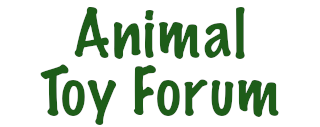- Welcome to Animal Toy Forum.
News:
The official blog of the Animal Toy Forum is now LIVE! Check it out at Animal Toy Blog!
Disclaimer: links to Ebay.com and Amazon.com on the Animal Toy Forum are often affiliate links, when you make purchases through these links we may make a commission.
User actions



